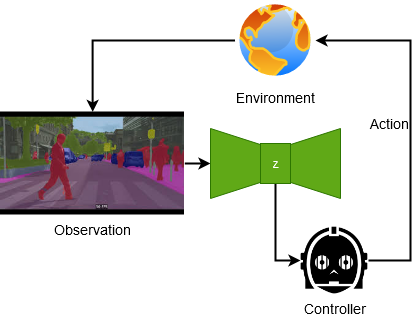Seminar: Robot Learning
Prof. Dr. Abhinav Valada
Co-Organizers:
Akshay L Chandra Julia Hindel Martin Büchner Iman Nematollahi
Deep learning has become a key enabler of real world autonomous systems. Due to the significant advancement in deep learning, these systems are able to learn various tasks end-to-end, including for perception, state estimation, and control, thereby making important progress in object manipulation, scene understanding, visual recognition, object tracking, and learning-based control, amongst others. In this seminar, we will study a selection of state-of-the-art works that propose deep learning techniques for tackling various challenges in autonomous systems. In particular, we will analyze contributions in architecture design, and techniques selection that also include computer vision, reinforcement learning, imitation learning, and self-supervised learning.

Course Information
|
Details:
|
Course Number: 11LE13S-7317-M
Places: 12
Room 00.021, building 080
|
|
Course Program:
|
Introduction: 16/10/2025 @ 16:00
How to Make a Presentation: 12/01/2026 @ 14:00
Block Seminar: 06/02/2026 @ 09:00
|
|
Evaluation Program:
|
Seminar Presentation: 06/02/2026 @ 09:00
Summary Due Date: 20/02/2026 @ 23:59
|
|
Requirements:
|
Basic knowledge of Deep Learning or Reinforcement Learning
|
|
Remarks:
|
Topics will be assigned for the seminar via a preference voting. If there are more
interested students than places, places will be assigned based on priority
suggestions
of the HisInOne system and motivation. The date of registration is irrelevant. In particular, we
want to avoid that students grab a topic and then leave the seminar. Please have a coarse
look at all available papers to make an informed decision before you commit.
|
Course Material
|
Slides:
|
Lecture 1: Introduction
Lecture 2: How to Make a Good Presentation
|
|
Templates:
|
Additional Information
Enrollment Procedure
- Enroll through HISinOne, the course number is 11LE13S-7317-M.
- The registration period for the seminars is from 13/10/2025 to 20/10/2025.
- Attend the introductory session on 16/10/2025.
- Select three papers from the topic list and complete this form (disclosed only during the introduction session) by 20/10/2025.
- Places will be assigned based on priority suggestions of HISInOne and motivation of the student on 23/10/2025.
Evaluation Details
- Students are expected to prepare a 20-minute long presentation and draft a summary.
- The seminar will be held as a "Blockseminar".
- The slides of your presentation should be discussed with the supervisor two weeks before the Blockseminar.
- The summary should not exceed seven pages (excluding bibliography and figures). Significantly longer summaries will not be accepted.
- Ensure you cite all work you use including images and illustrations. Where possible, try to use your own illustrations.
- The final grade is based on the oral presentation, the summary, and participation in the blockseminar.
What should the Summary contain?
The summary should address the following questions:
- What is the paper's main contribution and why is it important?
- How does it relate to other techniques in the literature?
- What are the strengths and weaknesses of the paper?
- What would be some interesting follow-up work? Can you suggest any possible improvements in the proposed methods? Are there any further interesting applications that the authors might have overlooked?
Graded Component Submission
- Save your document as a PDF and directly submit it to your topic supervisor via email.
- The filename should be in the format "FirstName_LastName_X.pdf" where X is the evaluation component (Summary / Presentation).
Topics
-
Modality-Incremental Learning with Disjoint Relevance Mapping Networks for Image-based Semantic Segmentation
Supervisor: Julia Hindel
-
Fed-EC: Bandwidth-Efficient Clustering-Based Federated Learning for Autonomous Visual Robot Navigation
Supervisor: Julia Hindel
-
Privacy Risks in Reinforcement Learning for Household Robots
Supervisor: Julia Hindel
-
Continual Learning of Unsupervised Monocular Depth from Videos
Supervisor: Julia Hindel
-
Reducing Non-IID Effects in Federated Autonomous Driving with Contrastive Divergence Loss
Supervisor: Julia Hindel
-
HOMER: Learning In-the-Wild Mobile Manipulation via Hybrid Imitation and Whole-Body Control
Supervisor: Martin Büchner
-
VGGT-SLAM: Dense RGB SLAM Optimized on the SL(4) Manifold
Supervisor: Martin Büchner
-
Steerable Scene Generation with Post Training and Inference-Time Search
Supervisor: Martin Büchner
-
Planning from Point Clouds over Continuous Actions for Multi-object Rearrangement
Supervisor: Martin Büchner
-
ScrewSplat: An End-to-End Method for Articulated Object Recognition
Supervisor: Martin Büchner
-
V-JEPA 2: Self-Supervised Video Models Enable Understanding, Prediction and Planning
Supervisor: Iman Nematollahi
-
Unified World Models: Coupling Video and Action Diffusion for Pretraining on Large Robotic Datasets
Supervisor: Iman Nematollahi
-
SENSEI: Semantic Exploration Guided by Foundation Models to Learn Versatile World Models
Supervisor: Iman Nematollahi
-
Continual Reinforcement Learning by Planning with Online World Models
Supervisor: Iman Nematollahi
-
Mobi-π: Mobilizing Your Robot Learning Policy
Supervisor: Iman Nematollahi
-
Steering Your Diffusion Policy with Latent Space Reinforcement Learning
Supervisor: Akshay L Chandra
-
VLA-RL: Towards Masterful and General Robotic Manipulation with Scalable Reinforcement Learning
Supervisor: Akshay L Chandra
-
RoboMonkey: Scaling Test-Time Sampling and Verification for Vision-Language-Action Models
Supervisor: Akshay L Chandra
-
Deep Reactive Policy: Learning Reactive Manipulator Motion Planning for Dynamic Environments
Supervisor: Akshay L Chandra
-
ReinFlow: Fine-tuning Flow Matching Policy with Online Reinforcement Learning
Supervisor: Akshay L Chandra
Questions?
If you have any questions, please direct them to Akshay L Chandra before the topic allotment, and to your supervisor after you have received your topic.

